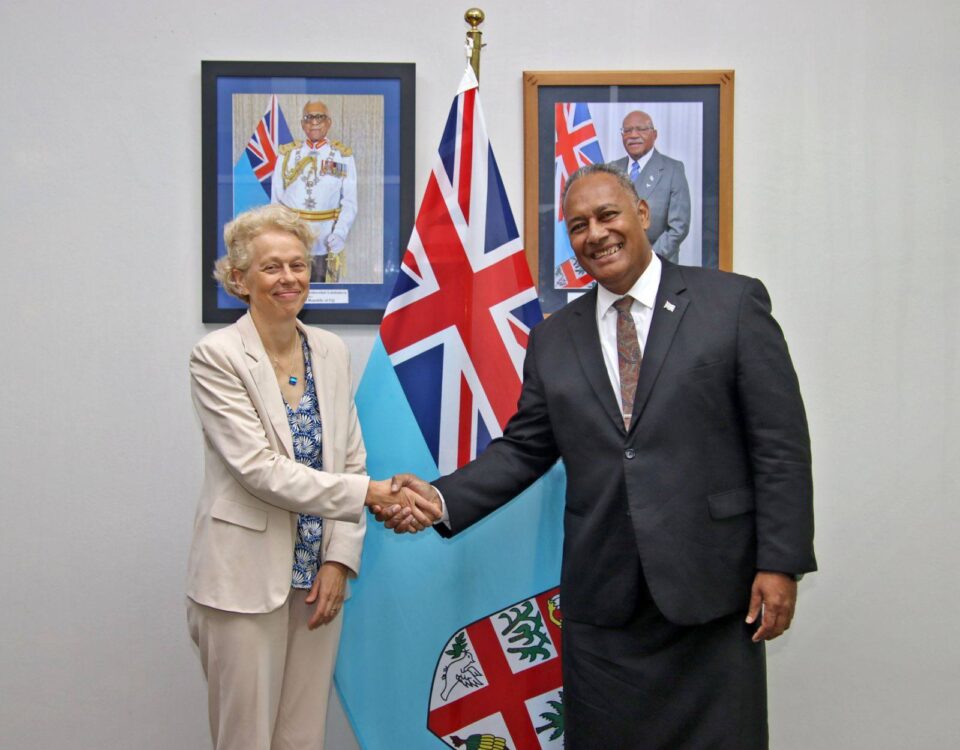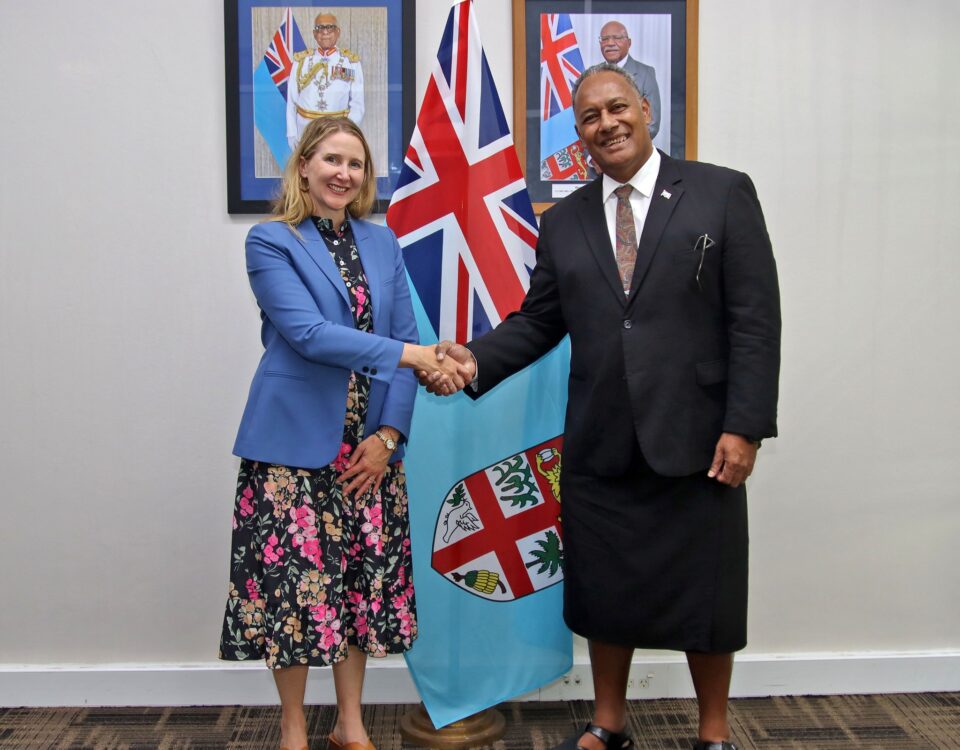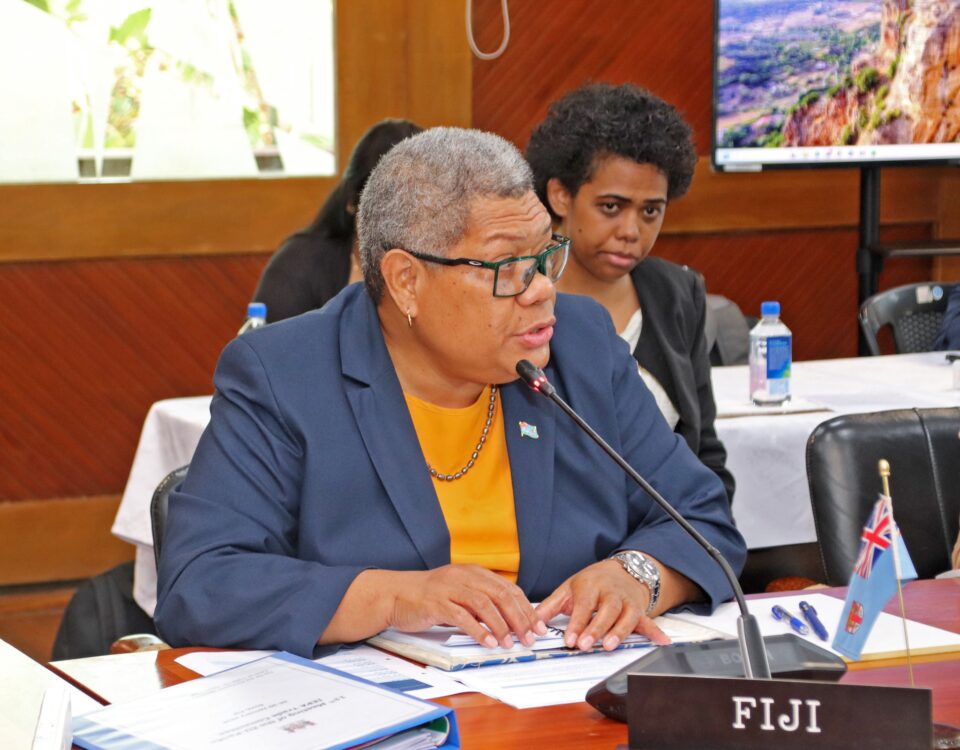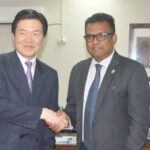
PS Karan Receives Farewell Courtesy Call from Ambassador Omura
24/11/2020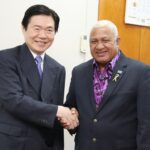
PM Receives Farewell Courtesy Call from Japanese Ambassador
25/11/2020Published On: 24/11/2020
The Minister for Defence, National Security and Policing, Hon Inia Seruiratu;
Your Excellency, the Australian High Commissioner, Mr. John Feakes;
The Director-General of the National Security Defence Council Secretariat, Brigadier-General Jone Kalouniwai;
Distinguished Participants;
Ladies and Gentlemen.
Bula Vinaka and a very good morning to you all.
I spent last week on Kadavu which – for those who have not been – is among the most beautiful patches of paradise on Earth. Beauty aside, the island is also the frontlines of the climate crisis. While there, we opened a new seawall in Namuana Village, and we handed over the keys to seven newly-relocated homes in Narikoso Village to families whose old homes had been lost to the rising seas.
Everywhere we went, we could see the devastating impact of Tropical Cyclone Harold, which slammed into Kadavu earlier this year. As we gather here at the Outrigger, in the comfort of this air-conditioned room, I want us to think of those Fijians, their struggles, and their spirit of resilience. It is for their sake, the sake of every Fijian, and the sake of all of humanity that we gather here at Fiji’s first-ever Climate Induced Security Workshop to help address the impacts of climate change; the single greatest threat our planet has ever faced.
If today’s attendance is any indicator –– alongside the great public interest this event has attracted –– this workshop is only the beginning of an exciting new chapter in Fijian climate security.
I first wish to convey my sincere gratitude to the Australian Government for its generous support of this Workshop here in Fiji, both in its planning and funding.
Ladies and Gentlemen, today will build upon progress that we already made at this September’s Maritime Domain Awareness Workshop. There, it became glaringly apparent that climate change is the single most pressing threat to the safety, stability, and security of Fiji and all of the Pacific, and we needed a plan to ensure that –– especially amid the ongoing global pandemic –– this danger wasn’t placed on the back burner.
On the world stage, Fiji is a relentless advocate for climate action. But even if tomorrow every nation committed to join us in achieving net-zero carbon emissions, the seas would not stop rising overnight, nor would the climate revert to its pre-industrial patterns. The science tells us, because of the carbon humanity has already emitted, climate impacts would still become far more severe before they ever abated. The world would still have to reckon with a crisis of climate migration, climate-driven conflict fuelled by competition for competing resources, and the heavy economic costs of climatic disasters. We must deal with the world as it is and as it will be.
That is why we must adapt by building resilience. Not only at the Government level, but as a society. Every business, every civil society organsiation, and every Fijian must understand these issues and know their role in confronting them.
Ladies and Gentlemen, that is why we are here this morning. Climate change is national security threat number one for Fiji. Building climate resilience is complex and urgent of an issue as they come. It not only looks at rising sea level, population displacement and more consistent and extreme weather events, but also must consider the many less-apparent, indirect impacts of climate change, like its potential to unravel recent progress of our nation’s water, food and health security. These lasting repercussions, both direct and indirect, will be disastrous for Fiji if plans and strategies are not put in place to respond to them.
A more climate-secure future for Fiji has been at the core of a number of strategic roadmaps that are guiding our pro-active approach to resilient development –– our Green Growth Framework, Fiji’s 5 and 20-Year National Development Plans, and the National Climate Change Policy, which is currently in its second round of consultations.
The world looks to Fiji as a climate champion because we were the first country to ratify the Paris Agreement, and among the first to engrain climate-centric thinking across our development by moving our Climate Change Unit into our Ministry of Economy. That’s because we know that, when it comes to a changing climate and rising seas, the best defence is a good offense. We’ve taken that to heart, investing hundreds of millions of dollars into the resilience and adaptation of Fijian infrastructure.
Of course, we have to step-up the pressure on the high-emitting countries of the world to commit to achieving net-zero emissions. Now, more than ever, is the time for real and meaningful action before it is too late. For too many Fijians, this enemy is existential. Rising sea levels threaten our coastal communities, already resulting in the planned relocation of up to 48 communities across Fiji. That is a scar borne by the hands of the world’s high-emitting countries and companies.
To protect our progress, and pave the way to a more climate-secure future, we must look far beyond this Workshop. In order to control –– and ultimately defeat –– the security threat that climate change poses to Fiji, a “whole of nation” response is absolutely crucial. This means Government, the private sector, and civil society working hand-in-hand, including civil-military co-ordination, to devise activities to mitigate against these threats. There must be co-ordination and collaboration between our nation’s policy-makers, our policy implementers, and our communities to ensure that the most inclusive policy options are both openly discussed and effectively implemented.
So today and every day after, I ask those of you in this room to commit to collaboration, and to look beyond your normal, everyday bubbles for perspective on how we can cultivate a more climate-secure Fiji.
No one workshop, let alone one person, can possibly hold all the answers when it comes to an issue so complex –– one that is simultaneously so collective, yet so personal. Climate change threatens us all, and we must work together to respond to this greatest of tests to our national security. Only then can we be proud of handing Fijian children and grandchildren a safer and more resilient nation than we were born into.
Ladies and Gentlemen, Distinguished Guests, it is now my pleasure to declare Fiji’s first Climate Induced Security Workshop officially open.
Vinaka vakalevu, Thank you, and God bless Fiji.



